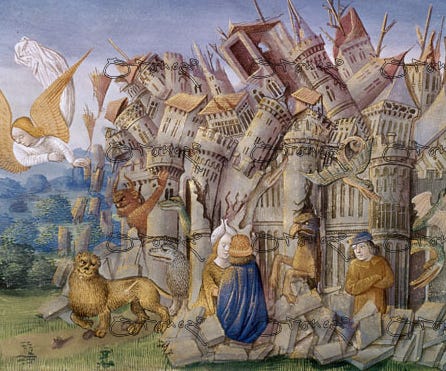A few years ago, I started a Substack under my Benedictine oblate name—Bede Thomas—while I was in formation for the diaconate. I had withdrawn from social media and writing for Catholic publications, and wanted a quiet place to park theological papers and write the occasional post. I didn’t really make much use of it, and only a few knew of its existence.
That site has now migrated here, under my own name and a new title.
The title, from Psalm 102, seemed apt, because the Psalms are at the heart of my devotions, and the image of the owl is heavy with religious and mythical meaning.
And the ruins?
We’re living in them.
There’s no getting away from the notion that we are on the familiar glidepath of a late empire, and the only hope is, as it always was, Christ and His Church. I became a deacon to serve Christ, His Church, and His people. Different moments call for different Christs: Christ the King, Christ glorified, Christ triumphant, Christ suffering, Christ meek, Christ flipping tables. Our present time calls for Christ the Servant, and that is what the deacon models.
Schiller wrote “What’s old collapses, times change, / And new life blossoms in the ruins.” (Wilhelm Tell) He thought that new life would blossom from the pure reason of the Enlightenment.
That didn’t work out the way they hoped, and now the Enlightenment itself is in ruins, while the blossoms are the small communities who hold the true faith. In Isaiah 34, the night creatures cavort among the ruins of Babylon–where, by the way, our owl is also found:
There the owl will make her nest;
she will lay and hatch her eggs
and gather her brood under her shadow
Hope survives, even there. Life is always trying to burst through the cracks of the tumbled stones. In the very next chapter, Isaiah says:
The desert and the parched land will be glad;
the wilderness will rejoice and blossom.
Like the crocus, it will burst into bloom;
it will rejoice greatly and shout for joy.
Build Better
To his credit, Schiller saw the problems of his age, and ours, clearly enough:
we see the spirit of the age wavering between perversity and brutality, between unnaturalness and mere nature, between superstition and moral unbelief; and it is only through an equilibrium of evils that it is still sometimes kept within bounds. (On the Aesthetic Education of Man)
Secular culture, running on the fumes of its Christian inheritance, is trying to manage that “equilibrium of evils,” and it doesn’t seem to be working out so well. Our technology allows us to preserve a sense that things are going along swimmingly, with advances in communication, pharmaceuticals, transportation, computing technology, and all the other indicators of advanced civilization, but it seems like chrome over rust. We feel hollowed out and lost, and the reason is not at all difficult to find: we’ve lost God, and too many who proclaim themselves Christians don’t really seem to believe the hard truth of the Gospel, at least not at the fundamental level that matters.
And so, those are the ruins. As T.S. Eliot, that great Christian chronicler of decay, wrote in a Chorus from The Rock:
Build better than they that build without the LORD.
Shall we lift up our feet among perpetual ruins?
I have loved the beauty of Thy House, the peace of Thy sanctuary,
I have swept the floors and garnished the altars.
Where there is no temple there shall be no homes,
Though you have shelters and institutions,
Precarious lodgings while the rent is paid,
Subsiding basements where the rat breeds
Or sanitary dwellings with numbered doors
Or a house a little better than your neighbour’s;
When the Stranger says: “What is the meaning of this city?
Do you huddle close together because you love each other?”
What will you answer? “We all dwell together
To make money from each other?” or “This is a community?”
And the Stranger will depart and return to the desert.
O my soul, be prepared for the coming of the Stranger,
Be prepared for him who knows how to ask questions.
O weariness of men who turn from GOD
Build better and Be prepared for the coming of the stranger … of him who knows how to ask questions. Sound advice.
Our answer can’t just be complaint or lament, but the light and hope of the Gospel, which offers more than the world ever can. We need to go, in the words of C.S. Lewis, further in and further up.
Our world has to be more than an “equilibrium of evils.” It has to the light of God, and we who believe need to hold that light aloft. It’s not going to be easy—it was never even supposed to be. While we live, Jesus can promise only the cross, but that’s everything–the very axis on which the universe turns.
T.S. Eliot understood that, too, as he makes clear in the last lines of Four Quartets. What the Christian seeks is
A condition of complete simplicity
(Costing not less than everything)
If we tend the fire of the Spirit in ourselves, and let it shine for all to see, it will make us ready for the purifying fire all men must face.
And all shall be well and
All manner of thing shall be well
When the tongues of flames are in-folded
Into the crowned knot of fire
And the fire and the rose are one.
And from those ruins will grow the New Jerusalem.




